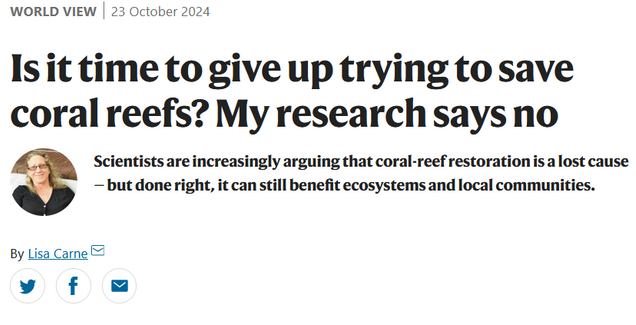News
April 25, 2025: New Publication in Journal of Great Lakes Research
John Okechi and Les Kaufman published a new study in Journal of Great Lakes Research. This study assessed the impact of Nile tilapia cage farming on water quality in Lake Victoria. Significant differences between cage and control sites were found, particularly in dissolved oxygen, pH, and silica. Results highlight the need for site-specific management to balance aquaculture development with ecosystem health in tropical lakes.
March 13, 2025: Photo of the Month

A female nurse shark (Ginglymostoma cirratum) swims along the bottom of the reef. This wildlife encounter was spotted by Fabio Buitrago and Cat Hauser during a dive at Turneffe Atoll, Belize.
February 26, 2025: Photo of the Month
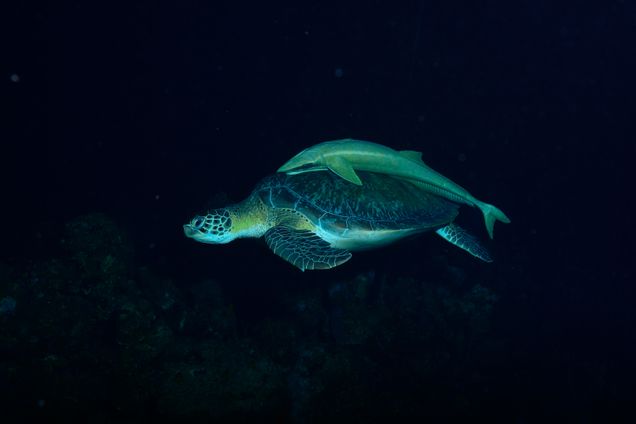
Fabio captured this photo of a remora on the carapace of a green sea turtle during a night dive in Roatán. The remora removes parasites found on the sea turtle in a symbiotic relationship.
February 10, 2025: Drone Workshop in Belize
Ethan Deyle visited Placencia, Belize to support our collaborators at Fragments of Hope with a drone workshop. He met with students from the University of Belize and exchanged study site data.
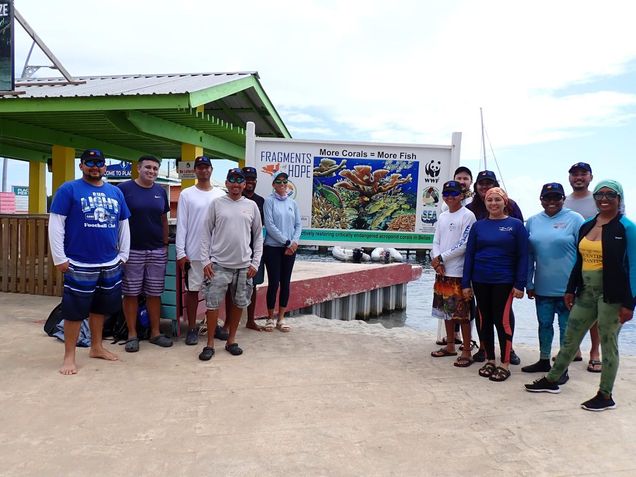
January 15, 2025: Hot off the press!
Ethan Deyle has published a preprint titled, “Extending empirical dynamic modeling to cross-sectional data beyond traditional time series.” The preprint is available to read now.
December 13, 2024: Reef Futures Global Symposium
Reef Futures was held from December 9 – 13, 2024 in Riviera Maya, Mexico. Dr. Kaufman and Dr. Deyle were invited to present about coral restoration and nature-based solutions.
November 19, 2024: Photo of the Month
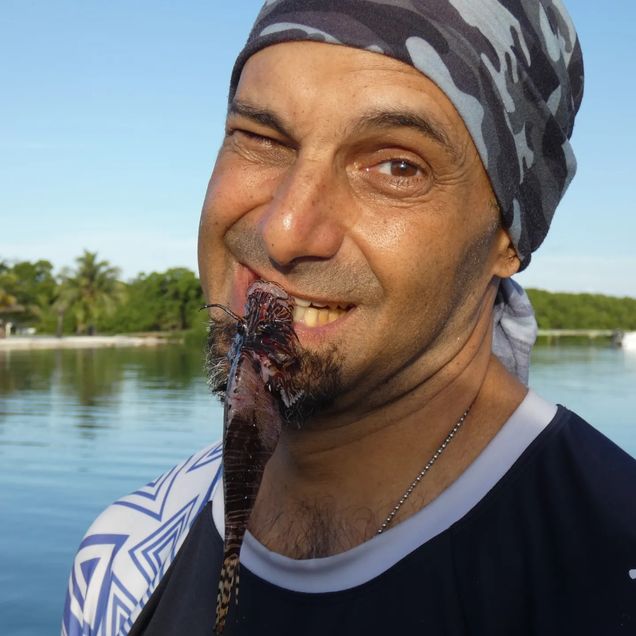
We’d be “Li-on” if we said we don’t love fish!
November’s photo of the month features our PhD candidate Fabio Buitrago demonstrating a unique, no-hands-needed technique for holding an invasive lionfish in Belize! On a more serious note, lionfish unfortunately have been spreading aggressively outside of their native range of the South Pacific and Indian ocean. Their impacts on coral reefs in particular can be very significant and detrimental. If you’re curious about lionfish and their impacts as an invasive on Atlantic marine ecosystems, check out this NOAA webpage!
October 25, 2024:
Congratulations to our own PhD candidate Fabio Buitrago for winning a PADI Ocean Torchbearer Award! These awards are given in recognition of PADI members who are “leaders in their communities, actively working toward a better balance between humanity and the ocean.” Make sure to check out PADI’s feature article about Fabio and the lessons he has to share about making meaningful conservation!
October 24, 2024:
One of our coral research partners, the amazing Lisa Carne (Executive Director of Fragments of Hope), has written a thoughtful and compelling article about why restoring coral reefs is not a lost cause (even when it can feel evermore hopeless that humans can’t bend the climate change curve)! We are grateful to be able to work with Fragments of Hope to better understand coral restoration in the Caribbean and applaud the FOH’s team unrelenting dedication!
October 18, 2024: A wish for a grant … has been granted!
Congrats to our postdoc Dr. John Okechi, who has just been awarded a grant to continue his research on Lake Victoria cage aquaculture with our lab!
Okechi has been awarded a grant totaling to $121,392.00 (effective January 1, 2025) for continued postdoc research at the Kaufman-Deyle Lab; the grant is titled “The impact of cage fish farming on the ecology and biodiversity of Lake Victoria”. Cage aquaculture is a rapidly expanding industry in tropical freshwater lakes worldwide. His research examines the impacts of Nile tilapia (Oreochromis niloticus) cage farming on water quality across spatial scales in the world’s largest tropical lake, Lake Victoria. The primary objective is to determine if water quality patterns differ between cage and control stations along a spatial limnological gradient, and to identify the water quality variables that contribute most to these differences. We hypothesize that the spatial arrangement of sites in the lake would primarily drive main patterns of water quality variation, while cage aquaculture would have significant impacts on these parameters across the spatial gradient. The study is also to investigate the effectiveness of in-situ and ex-situ conservation efforts of O. variabilis and O. esculentus in enhancing species populations and habitat conditions in the lake. Physicochemical parameters will be determined from both cage and control stations at the four locations along a known gradient in limnology from the inner Winam Gulf to open waters at Mfangano Island. The findings will highlight the site-specific management strategies to mitigate the environmental impacts of cage aquaculture in tropical lakes. The study will also provide an approach that can be applied to tropical lakes and reservoirs around the world, as cage aquaculture continues to expand in these ecosystems.
October 11, 2024: Out and about in Beantown to share science!
Dr. Deyle was recently hosted at the Parson’s Lab seminar series at MIT and the Biology Dept seminar series as Tufts. Thank you to both programs for great conversations and connections!
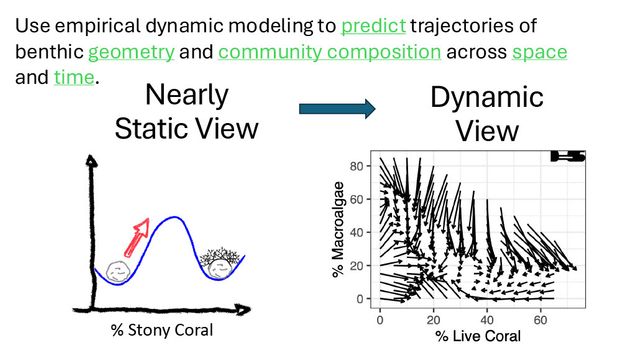
October 1, 2024: Photo of the Month
Brace yourself for some charismatic megafauna!
October’s Photo of the Month features PhD candidate Catherine Lee Hing with a loggerhead turtle! Cat is a member of the Loggerhead Sea Turtle Research Experiment on the Thermal Corridor Hypothesis (STRETCH) team (not affiliated with BU). Over a four-year period, the STRETCH team will release approximately 100 loggerhead turtles equipped with satellite tags to track their movements in relation to oceanographic conditions. The picture was taken in July 2024 while Cat was onboard a shipping vessel en route from Japan to Panama, transporting the second cohort of loggerheads to their release point in the Pacific Ocean!
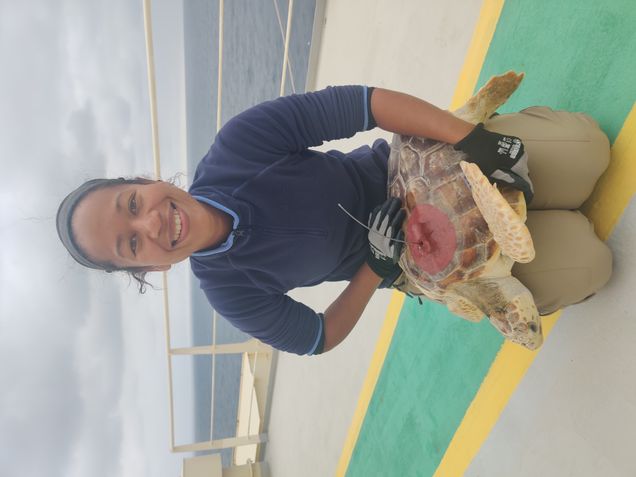
Photo credit: Catherine Lee Hing
June 2024:
Check out a short video about what PhD student Mira Kelly-Fair (#BlueCarbon) is working on this year on BU’s IGS (Institute for Global Sustainability) Instagram!
August 2023:
Check out this August 2023 article from Climate Spotlight, which highlights the incredible results of work done by nonprofit Fragments of Hope, which the Kaufman-Deyle lab has supported by analyzing photomosaics of coral reefs: https://climatespotlight.com/seeing-is-belizing-community-led-resilient-reef-restoration/
